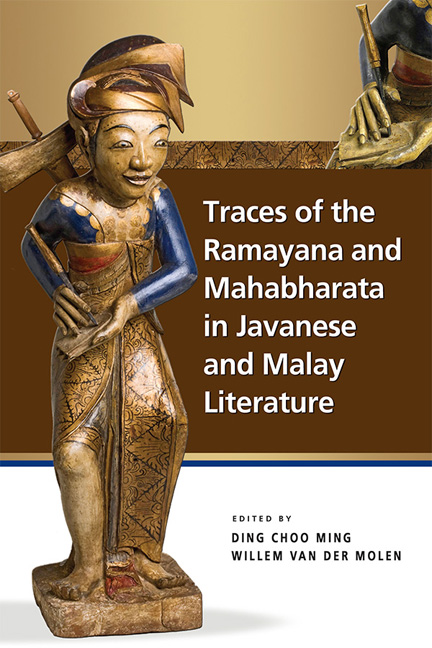Book contents
- Frontmatter
- Contents
- Abbreviations
- About the Contributors
- 1 Introduction
- 2 The Rāmāyaṇa in Java and Bali: Chapters from its Literary History
- 3 Abimanyu Gugur: The Death of Abimanyu in Classical and Modern Indonesian and Malay Literature
- 4 Drona's Betrayal and Bima's Brutality: Javanaiserie in Malay Culture
- 5 Ramayana and Mahabharata in Hikayat Misa Taman Jayeng Kusuma
- 6 The Death of Śalya: Balinese Textual and Iconographic Representations of the Kakawin Bhāratayuddha
- 7 The Illustrated Asṭabrata in Pakualaman Manuscript Art
- Index
- Nalanda-Sriwijaya Series
2 - The Rāmāyaṇa in Java and Bali: Chapters from its Literary History
Published online by Cambridge University Press: 04 July 2018
- Frontmatter
- Contents
- Abbreviations
- About the Contributors
- 1 Introduction
- 2 The Rāmāyaṇa in Java and Bali: Chapters from its Literary History
- 3 Abimanyu Gugur: The Death of Abimanyu in Classical and Modern Indonesian and Malay Literature
- 4 Drona's Betrayal and Bima's Brutality: Javanaiserie in Malay Culture
- 5 Ramayana and Mahabharata in Hikayat Misa Taman Jayeng Kusuma
- 6 The Death of Śalya: Balinese Textual and Iconographic Representations of the Kakawin Bhāratayuddha
- 7 The Illustrated Asṭabrata in Pakualaman Manuscript Art
- Index
- Nalanda-Sriwijaya Series
Summary
Taking as foundation an article by Professor A. Teeuw from 1986, this chapter aims to look at the questions of literary history, translation and transformation, as they apply to the theme of the Rāmāyaṇa, ranging from the Old Javanese Rāmāyaṇa in Java and Bali to the Serat Rama and Rama Keling in Java. The chapter takes socio-cultural setting into consideration, and concludes that much more basic philological work is needed before any satisfactory results can be produced.
Keywords: Old Javanese; Rāmāyaṇa; literary history; translation and transformation; structural analysis; transmission; manuscripts.
Introduction
Beyond the narrow circle of specialists, even among scholars of Southeast Asia, the very existence of a literature in a language called Old Javanese may come as a surprise, and so one should not automatically expect to find an appreciation of its special qualities. Yet it is undoubtedly part of the heritage of the people of Java and Bali who created it, and hence more generally of all Indonesians, constituting an element of their national culture.
At the same time, however, it has often been non-Indonesians who have taken an interest in Old Javanese, beginning with Dutch scholars in the colonial period, and continuing with others in various countries in the post-independence era. Such international attention suggests that the products of Old Javanese literature are by no means the exclusive possession of any one group, but are capable of taking their place among the treasures of world literature, which can be enjoyed by readers of any background. This is then the present writer's point of view.
The scholars who first came to the academic study of Old Javanese (as distinct from the traditional indigenous study) approached it from their understanding of the cultural history of the region, with its obvious links to Indian civilization — after all, the script used for writing and many of the themes could be traced to Indian origins. A knowledge of Sanskrit is understandably useful for reading Old Javanese. However, the spirit and the inspiration of many of these literary works, prose and poetry, is also plainly indigenous, so that we should not make the mistake of denying the Old Javanese authors due credit for their remarkable achievements.
- Type
- Chapter
- Information
- Publisher: ISEAS–Yusof Ishak InstitutePrint publication year: 2018

